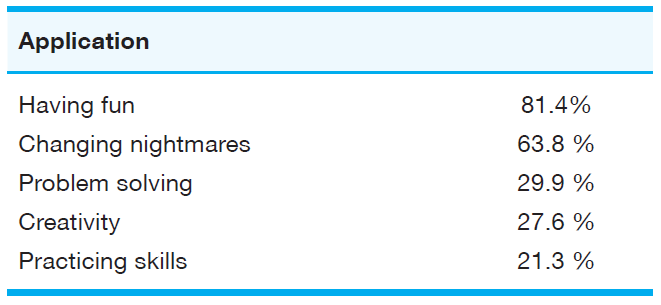This post is also available in Dutch.
In a previous DW blog, we showed that dreams can become “real” with lucid dreaming. Now we look at how you can benefit from this phenomenon.
Have you ever walked on Mars, travelled back to the time of the dinosaurs, or handled a lightsaber? You probably haven’t—at least not in real life. But with lucid dreaming, you can experience anything imaginable as if it was reality, with just the power of your (un)conscious.
Many people, including scientists, are excited about the potential of lucid dreaming. What can lucid dreaming do for scientific research and society? To answer this question, 301 lucid dreamers were asked about what they do when they are experiencing this particular stage of sleep. The table below shows the things they do the most.

Image edited from Schädlich et al.
We can see from this list that most lucid dreamers use that time to have fun and to overcome or avoid nightmares. These observations go along with society’s expectations regarding lucid dreaming. While the entertainment industry sees potential in the endless scenarios stemming from this phenomenon, clinicians, on the other hand, have already researched lucid dreaming as a therapeutic approach against nightmares, which is a common complaint of sleep deprivation patients. Some researchers believe this kind of therapy may also be used in the treatment of mood disorders that are connected to sleep deprivation, such as anxiety, post-stress traumatic disorder, or depression.
The questionnaire still shows that 20% to 30% of participants use lucid dreaming to practice skills, solve problems, or even increase their knowledge. The time they invest on themselves while dreaming may lead to a reward in the real world. Sports research shows, for example, that people practicing a motor task while lucid dreaming improved their performance as much as those that learned the same task while awake. Imagine now that lucid dreaming could be used to practice all sorts of things: the presentation you need to give next week, a first experience in piloting a plane, or even guitar lessons!
But how can you enjoy the benefits of lucid dreaming?
If you search the internet, you will find all sorts of suggestions for becoming a lucid dreamer such as keeping a dream diary, using light instead of sound alarms, or even taking galantamine (I would not risk the last one though). Regardless of these recommendations, one thing is certain: we still lack a deep understanding of lucid dreaming. Only with techniques that are approved by the scientific method will we be able to make lucid dreaming available to everyone.
That’s why experts from different areas have teamed up to design products that fulfill these requirements. One such example is technology that keeps track of sleep quality by assessing different body functions and manipulating the sleeper’s environment to enhance lucid dreaming.
In a follow-up blog, we’ll present more current technology available for lucid dreamers with Samir and Purva Raut, the minds behind iBand+, one of the most recent sleep technology products available on the market.
This blog was written by João, edited by Christienne and Marisha, and translated by Jill and Felix.
Credits: top image courtesy of Pixabay

Is there any research done of how to prevent or stop lucid dreams? I fear my lucid dreams but most articles and research don’t explain what you can do if your lucid dreaming is unwanted.
Dear Nicole,
Thank you for your comment. Although I wrote this blog, I’m not a lucid dreaming specialist, just a scientist that is very interested on the subject. So my answer to your question will be based on my general knowledge and on the research I gathered for this blog.
Unfortunately I haven’t found any research on how to avoid lucid dreaming. Research on this subject is taking its first steps, and researchers are still trying to understand what are the factors that lead to this sleep stage. Without knowing these factors, it becomes difficult to find how to stop their effect.
I’m sorry I could not provide a better answer. In fact, I’ve heard from some of my colleagues the same concern you exposed here. Society should address lucid dreaming researchers regarding this concern, and if I write another piece about this topic, I will definitely take this into account.
Best regards,
João